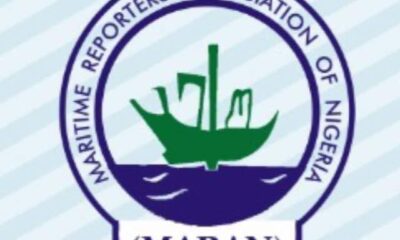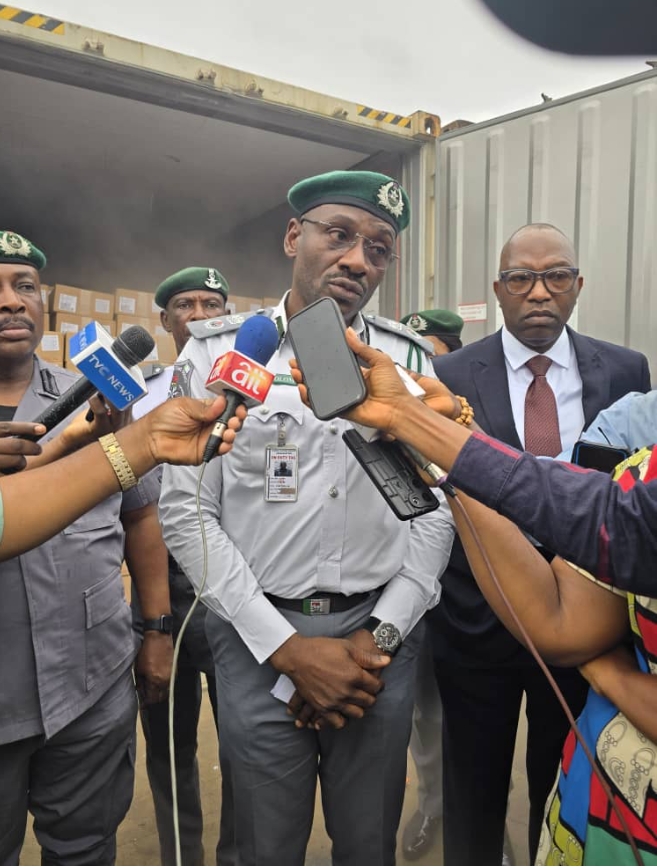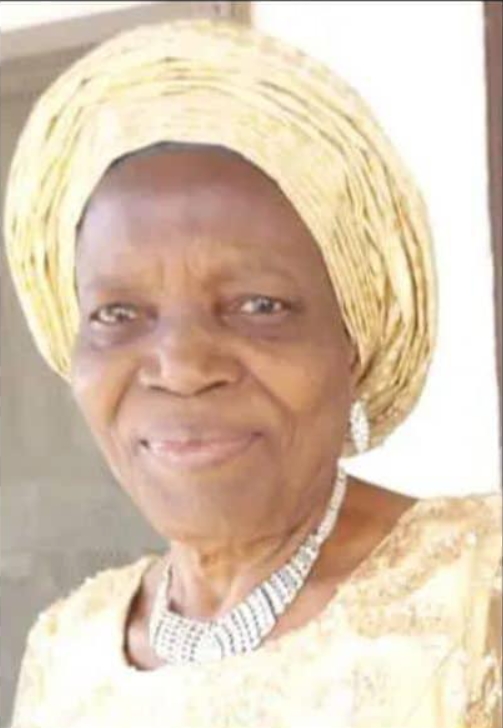Maritime Agencies
INSECURITY IN GoG: Expose and Deal With International Syndicates Now, MARAN Challenges FG
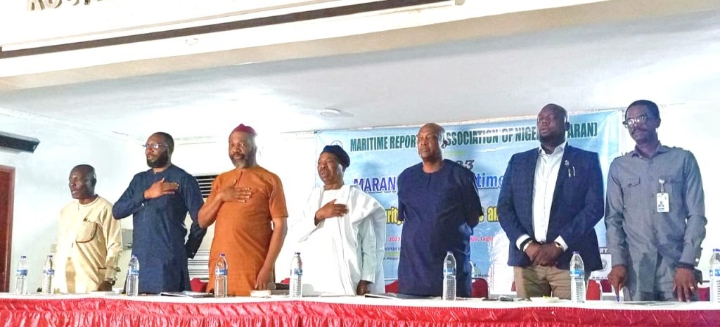
By Izuchukwu Ozoemena
Nigeria’s pioneer maritime journalists’ group, the Maritime Reporters Association of Nigeria (MARAN) has charged the Federal Government to take a second look at strategies on ground to address the nagging problem of oil theft and maritime insecurity in the Gulf of Guinea (GoG) especially at a time achievements recorded in recent years to address the menace appear to be fading away as resurgence is now being witnessed.
MARAN President, Godfrey Bivbere made the call in Lagos, Wednesday, at a one-day MARAN Annual Conference on the theme “Maritime Security: Emerging Threats and Actionable Steps”.
In his welcome address, he pointedly charged Nigeria authorities and other countries in the Gulf of Guinea (GoG) to go back to the drawing board and design more lasting strategies that will ensure that a resurgence of the frightening occurrences is not witnessed, going forward.
“We challenge the Nigeria Government and her regional counterparts to come up with a more workable and result- oriented approach to the fight against maritime insecurity in the GoG. We believe that until and unless the international syndicates involved in the menace are confronted, apprehended and regularly exposed, through international collaboration as often happens with local criminals, the situation will not achieve any purposeful deterrence.
MARAN, he stated, is fully supportive of President Bola Ahmed Tinubu in his wisdom to establish the sector-specific Ministry of Marine and Blue Economy in response to stakeholders’ view that it is one major step to turn around the fortunes of the nation’s maritime domain for the greater good of the economy.
“We envisage that President Tinubu may consider reworking the deterrence clauses contained in the SPOMO Act, to make its intendment more purposeful and business-like.
“MARAN respectfully, wishes to further urge President Tinubu to provide an improved enabling environment for a common and united combat against maritime insecurity through effective harnessing of all available windows, both public and private sector participation.”
Bivbere said MARAN feels deeply pained that since the first half of 2023, piracy has resumed in the GoG. The enormous security threats is a reality the journalists’ body find unacceptable, making her to contribute in whatever way possible to create a public awareness that will ginger the government to design better ways to address a lingering menace.
MARAN, Bivbere said, acknowledge previous and current efforts by the Nigerian Maritime Administration and Safety Agency (NIMASA), Nigerian Navy and their regional counterparts to address issue of piracy and related maritime threats in the GOG. But the body is particularly concerned about the frightening level of crude oil theft in the region beside illegal and unregulated fishing in the GoG by highly-placed international syndicates who enjoy the assistance of local collaborators.
The Federal Government and her counterparts in the region owe everybody the responsibility to rise to the occasion and put a permanent stop to it.
“MARAN is also worried about observed dissonance in the collective national effort to combat maritime economic crimes and crude oil smuggling, and call on the federal government and its relevant agencies to improve on coordination. I want to also especially call on the office of the National Security Adviser to the President, to have a firmer grip and supervision of the existing collaboration between state and non-state actors’ roles, in this regard.
“The International Maritime Bureau, IMB report of July 2023 confirmed that the GoG witnessed a surge in maritime incidents in 2023, with five of such incidents in the first quarter and nine in the second quarter. Out of these, 12 were classified as armed robberies and two as piracy, predominantly targeting anchored vessels within the region. In all the incidents, 14 crew members were kidnapped, out of which 8 were abducted from vessels on anchor. Additionally, in two separate hijacks, 31 crew members were taken hostage, communication and navigation equipment were destroyed, and some cargoes were stolen.”
Speaking at the event, Temi Omatseye, former Director-General of NIMASA observed that many illegal vessels operate on Nigerian waters. He advised that Nigeria should begin to issue ship entry notices to vessels before leaving or arriving at anchor.
“We should know who you are or where you are on Nigerian waters. We must stop playing politics with the shipping industry.”
“We should set up a Restore Zone Transportation Corridor to spot vessels moving in and out of the approved nautical areas. It enables Nigeria to know who is in her maritime territory.”
He emphasized that there is no crude theft in Nigeria. Whatever happens is at the terminals.”
In his intervention, Sesan Onileimo, notable maritime journalist and former President of MARAN attributed majority of issues of crude oil theft and piracy taking place in Nigerian waters to youth unemployment. Onileimo who publishes Shipping Position said that the maritime threats happening in the Niger Delta are rampant and will continue to be rampant as long as the system keeps churning out a large army of able-bodied but unemployed youths who easily become a willing tool in the hands of godfathers who sponsor piracy, crude oil theft and other maritime crimes in the Gulf of Guinea.
He described crude oil theft and piracy as a localized business because people from other geographic areas who are not versed in aquatic business as their counterparts in the Niger Delta cannot make a success when they venture in them.
“There’s a mass of unemployed youths that the society has foisted on us; an idle hand is a willing tool.”
“And I will like to look at this from two angles. There are two categories of unemployed willing youths: the ones trained by NIMASA under its National Seafarers’ Development Programme who were trained, qualified with or without Certificate of Competency (CoC) but waiting to have something to do. They are there, they want to be active, they are the tools that are being used to forment trouble.
“The second leg are those boys and girls who are trained locally, some of them are trained at MAN, Oron, but there are those that are trained even in Agege here who wear uniforms so much so like that of the Navy. They are equipped and recruited into that business that has turned out to be a source of threat to our maritime environment.
“I am saying this because in the course of my years as a maritime journalist, I have had cause to interact with a few of them. If you go to Liverpool here, I am sure the Maritime Workers’ Union will bear me witness; the boys and girls who graduated from Oron, who have turned out to be canoe boys, were not trained in Oron to be handling canoe and boats but there is no job for them. These are the same boys who had five years of training but afterwards, there is no job. Take that guy to Niger-Delta, he is ready to do anything for as long as the money is available”, Onileimo explained.
Adding his voice, Otumba Sola Adewunmi, President, Nigerian Indigenous Shipowners Association, (NISA) advised Nigeria as a country to work hard to have a safe sea where one could sail to wherever he wanted to do his business and safely come back. Adewunmi who suggested putting in place a Nigerian equivalent of the P&I oof Singapore observed that there was so much competition at sea, the equipments are there but with inefficient, uncommitted and inexperienced people to man them.
For instance, he stated,
the Navy’s situation room known as the Falcon Eye, captures and displays everything that happens at sea. But a selfish agenda, he regrets, often lead to inefficiency in job discharge.
“There’s nothing that happens at sea that they don’t see but you will realize that most of our security agents are engrossed with what will come into their pockets. A situation whereby they do everything to their advantage is one of the reasons we are having issues.
“What did Lome have that we do not have in Nigeria?This is the question we should just ask ourselves. These people saw our weakness and made sure that their anchorage was secure. It attracts international operators and they started making money out of it. What is the work of our security agencies? And even when arrests are made, are they not made on frivolous excuses? All these things still go to say what is going to be the benefit to me.
“Until we put the benefit of the nation and what the nation will earn overall, I think we are in a better position to protect our waters very well but this era of entitlement, ‘it is our entitlement, we must get it’, I think it is part of the issues that we have. And as much as these things are there, we will continue to have a higher cost of bringing vessels to this place.”
He opined that if the security agents could work together and there is a good judicial system, Nigeria can achieve a lot.
In his contribution, Capt Tajudeen Alao, President, National Association of Master Mariners (NAMM) stated that maritime crime being a big business whose tentacles spread across the globe cannot be perceived as a Nigerian thing. He advised the participants at the lecture to sit down as a group, brainstorm and come up with workable proceedings that could be presented to the Minister of Marine and Blue Economy to implement.
“Whatever we think is the right thing to do, there must be procedures and guidelines and once the Minister can make subsidiary legislation, it could go a long way in tackling most of these challenges. The trend now is, if you arrest a ship now engaging in illegal bunkering, you blow it up, does it make sense? The air pollution into the sky, the oil pollution into the ecosystem, you have destroyed the fish and periwinkles in that area.
“There are many things that we do. Like my colleague said, you arrest a ship, EFCC doesn’t know how to manage ship. The ship is there, they are waiting for the Police to go to court, the ship becomes a wreck, then, NPA and NIMASA will devote $2 million to salvage a ship that does not worth more than $300,000.”
He insisted that a deliberate action and political must exist before crime can be addressed.
“The Navy”, the NAMM boss continued, “cannot afford to fund maritime security just as it cannot afford to keep the ships at sea with the budget within its disposal”.
“It finds it comfortable relying on the Nigerian Maritime Administration and Safety Agency, (NIMASA) to fund most of its operations”.
Customs
Ogun 1 Customs Hosts FAED 2026, Highlights Gains of Cross-Border Cooperation, Economic Empowerment and Entrepreneurial Development.
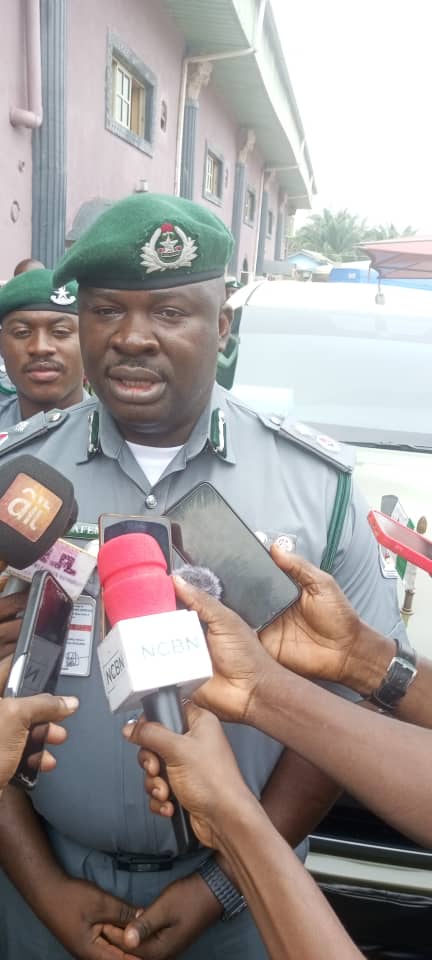
By Izuchukwu Ozoemena
The Acting Customs Area Controller (CAC), Ogun Area 1 Command of the Nigeria Customs Service, Deputy Comptroller O.O.Afeni says the Festival of Arts For Economic Development (FAED) continues to reflect a shared understanding that sustainable border management goes beyond enforcement to encompass cross-border cooperation, economic empowerment and entrepreneurship development within the border communities.
Deputy Comptroller Afeni spoke at the Idiroko Border, Thursday, while declaring open the international colloquium to mark the 5th edition of the Festival of Art for Economic Development to which the Nigeria Customs Service is a strategic partner.
He said: “The theme, ‘Rebranding Borderline Communities through Creative Empowerment and Entrepreneurship,’ aligns with the Nigeria Customs Service’s commitment to supporting legitimate trade, encouraging value addition, and promoting small-scale enterprises as drivers of economic growth and border stability.
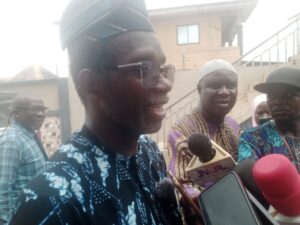
Dr Bonny Abisogun Botoku, Executive Producer, FAED.
He acknowledged the important role of the Nigeria–Benin Inter-Border Forum, under the leadership of its Permanent Secretary, Dr. Bonny Abisogun Botoku in advancing preventive diplomacy, structured dialogue and operational cooperation between Nigeria and the Republic of Benin.
”Through the empowerment programmes and entrepreneurship initiatives embedded in this Festival, we see practical pathways to reducing illicit activities, strengthening lawful commerce, and fostering inclusive economic opportunities for our people.”

Deborah Chiamaka Nwangene, one of the graduating trainees.
”The Nigeria Customs Service remains committed to partnerships that promote peaceful borders, resilient economies and sustainable regional integration.”
During a brief press chat, Comptroller Afeni spoke about enforcing government fiscal policies, saying that this must not be by force.
”The citizens must be made to know the reasons we are here. This is a way of showing the communities that we care about them. You can see that we have trained some people in the art of garri- making painting tye and dye (adire), etc. It’s a way of empowering the community.”
On suggestions that the seminar is capable of deepening cordial relationship between Benin and Nigeria, the CAC could not agree less.
”It is the fifth edition. It has been a situation we see the succeeding version getting better than the previous one. Today, I signed many certificates of people graduating. We’re not just training them; we’re empowering them so that we take them off the smuggling realm and make them better citizens.”
In his presentation, the Executive Producer of the Festival, Dr Bonny Abisogun Botoku described it as more than an event.
”It is a movement. It is a statement of belief—that border communities are not problems to be managed, but potentials to be unlocked.”
He recalled that for too long, border communities across Africa have been spoken about only in the language of risks exemplified in smuggling, insecurity, informality and marginalization.
”But those of us who live and work at the borders know a deeper truth. Borders are not just lines on maps. They are meeting points of culture, gateways of trade,
and spaces of shared history.

Sample of garri processed and packaged by a trainee.
”The Nigeria–Benin border is not a dividing line—it is a shared civilization. What we are doing through this Festival is to change the story from suspicion to trust, from survival to enterprise,
from isolation to integration.
Contrary to the widely-held belief that culture only concerns entertainment, he explained, culture is power, identity and economic capital.
”Through art, music, fashion, crafts, food systems, and storytelling, communities rediscover pride, cohesion, and voice.
Culture becomes a language of peace, dialogue, and diplomacy—especially in border spaces where differences must be managed with wisdom.
”This Festival deliberately places culture at the center of development, not at the margins.”
Distinguished guests at the event included the Onitaege of Itaege, HRM Oba Matthew Ademola Abisoye and other respected traditional rulers, government officials and representatives of security agencies. Others were partners from the Republic of Benin, artists, cultural practitioners and trainees.
Maritime Agencies
We’re Ever Proactive In Intercepting Prohibited, Falsely Declared Goods, says Controller Onyeka.
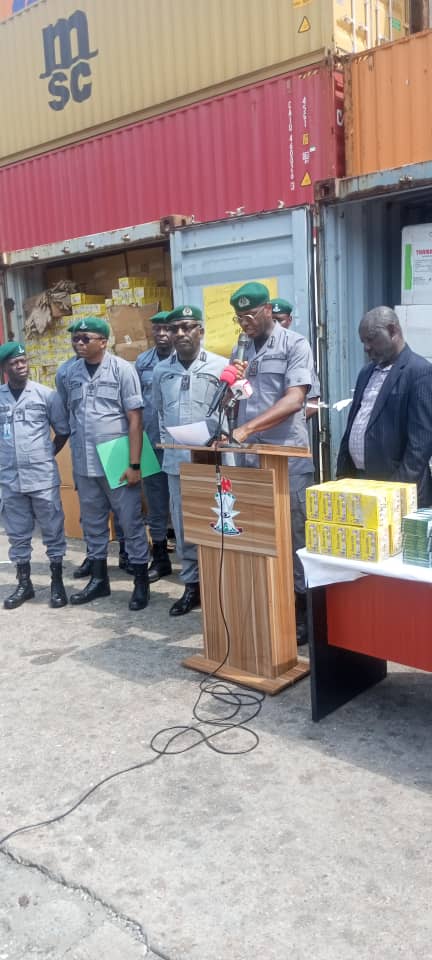
By Izuchukwu Ozoemena
In line with the core mandate of the Nigeria Customs Service, the Tincan Island Port Command is ever proactive in intercepting prohibited and falsely declared goods even as it remains committed to facilitate legitimate trade while contributing significantly to revenue generation.
The falsely declared goods include controlled pharmaceuticals, arms and ammunition, narcotics and other items capable of undermining public safety, security and stability.
The Customs Area Controller (CAC), Comptroller Frank Onyeka stated this in Lagos, Friday, while formally handing over three (3) units of 20 ft containers containing expired pharmaceutical products to the National Food and Drug Administration and Control (NAFDAC) for appropriate regulatory action.
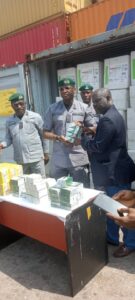
”The containers include two units with numbers PONU031958/6 and MSKU 711656/0 which were found to contain expired Tramadol tablets,” Onyeka announced.
”These consignments were thoroughly examined and the result revealed that the first container contained 86 cartons of Vingil Tramadol BP 50 mg while the second container held 250 cartons of the same expired Tramadol product”.
”The third container with number MSKU413519/1 was found to contain 370 cartons of expired Declofenac Sodium BP 50 mg tablets without a valid NAFDAC registration number, making the consignment illegal and dangerous for public use.”
Beyond these seizures, he explained, the Tincan Command has continued to record notable achievements in recent times through intensified cargo examination, improved intelligence gathering and sustained enforcement operations. These achievements are the result of deliberate strategies anchored on discipline, integrity and strong inter -agency collaboration.
He showed special appreciation to the operatives of NAFDAC for their consistent cooperation.
”Our synergy has continued to yield positive results particularly in ensuring that fake, substandard and expired drugs are intercepted before reaching the Nigerian populace.”
He equally commended officers and men of the Command for being resilient and committed to duty, a development that has continued to strengthen the credibility and operational effectiveness of the Command.
”Furthermore, I express our sincere appreciation to the Comptroller-General of Customs, Bashir Adewale Adeniyi, PhD, MFR, psc (+) for his purposeful leadership and strategic reforms which have empowered our operations.”
The CAC later handed over the prohibited pharmaceuticals to Mr Kareem Taiwo Adekunle, the Chief Regulatory Officer (Investigation and Inspection Directorate), NAFDAC, Apapa.
Maritime Agencies
Zone ‘A’ Coordinator, Mohammed Babandede, Visits Apapa Command, Commends Officers’ Sterling Performance.

By Izuchukwu Ozoemena
Officers and men of the Apapa Customs Command have received a special commendation for maintaining an exceptional performance in revenue generation, anti-smuggling operations and trade facilitation throughout 2025.
Mohammed Babandede, Assistant Comptroller-General of Customs (ACG) and Zonal Coordinator, Zone ‘A’ of the Nigeria Customs Service handed down the commendation during his familiarization visit to the Command, Thursday.
Chief Superintendent of Customs, Isa Sulaiman, the image maker of the Apapa Customs Command disclosed this in a press release.
Addressing officers and men during the visit, the image maker stated, the Zonal Coordinator explained that the purpose of his coming was to acknowledge the operational challenges faced by the Command, appreciate its notable achievements and further boost the morale of personnel who have consistently surpassed expectations, particularly in revenue collection where the Command exceeded its annual target.
”The ACG also lauded the Command’s sustained anti-smuggling efforts, especially the significant seizures of narcotics and other illicit substances including cocaine and tramadol, describing these interceptions as critical contributions to national security, public health and societal safety. ”
Effective enforcement, the ACG emphasized, remains fundamental to creating a secure environment for legitimate trade to thrive.
While noting that the core responsibilities of the Service extend beyond revenue generation to include national security, public safety and trade facilitation, the Zonal Coordinator commended the Apapa Command for its effective inter-agency collaboration. He urged officers to deepen cooperation with sister agencies, particularly in the deployment and promotion of trade facilitation tools that have positioned the Service at an upper-class operational rating.
The Zonal Coordinator further stressed the importance of integrity, reputational management, mentorship and capacity building within the Command. He urged senior officers to transfer knowledge and experience to younger officers while also drawing attention to the importance of officers’ welfare and health, disclosing that drug tests would be conducted across Commands. He advised officers to remain health-conscious for effective service delivery.
In his remarks, the Customs Area Controller, Apapa Area Command, Comptroller Emmanuel Oshoba, expressed appreciation to the Zonal Coordinator whose February 5 visit was motivating and timely. He reaffirmed the Command’s commitment to sustaining its performance in revenue generation, enforcement, trade facilitation, inter-agency cooperation and ethical conduct in strict adherence to the Nigeria Customs Service Act, 2023 and the policy thrust of the Comptroller-General of Customs, Dr Adewale Adeniyi.
-

 Customs2 weeks ago
Customs2 weeks agoFreight Forwarders Warn FAAN To Halt New Charges In Airport Cargo Operations or Risk Rumble in the Sector .
-
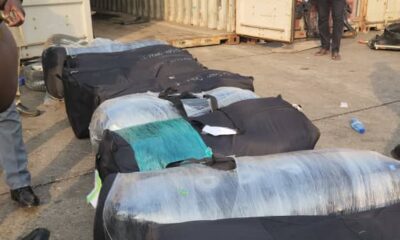
 Maritime Agencies3 weeks ago
Maritime Agencies3 weeks agoWAR AGAINST KILLER DRUGS: Apapa Customs, NDLEA Collaborate To Nab Huge Quantity of ‘Canadian Loud’.
-

 Customs3 weeks ago
Customs3 weeks agoLekki Deepsea Port: The Success Story of the Nigerian Ports Authority.
-
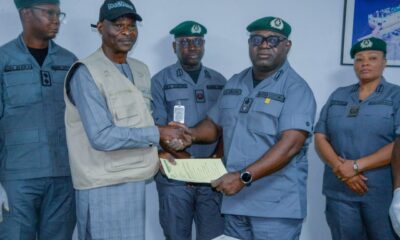
 Customs3 weeks ago
Customs3 weeks agoPTML Customs Hands Over Seized Arms and Ammunition, Collects N44.06bn in January.
-
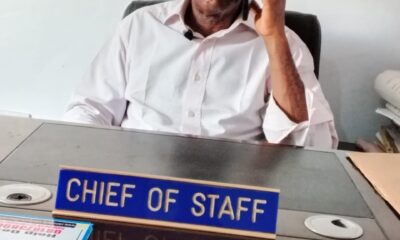
 Maritime Agencies3 weeks ago
Maritime Agencies3 weeks agoNAGAFF Compliance Team Set to Relaunch for Stronger Engagement, Enforcement.
-
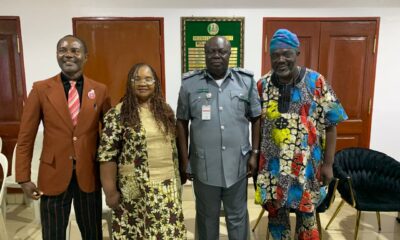
 Maritime Agencies3 weeks ago
Maritime Agencies3 weeks agoSeme Customs Raids Hideouts, Impounds 200 Bags of Smuggled Rice, Collects N2bn 3 Weeks into 2026.
-

 Maritime Agencies2 weeks ago
Maritime Agencies2 weeks agoNAGAFF Pledges Watertight Enforcement, Unveils A More Formidable 100% Compliance Team.
-

 Maritime Agencies2 weeks ago
Maritime Agencies2 weeks agoLekki Deepsea Port: The Success Story of the Nigerian Ports Authority.








